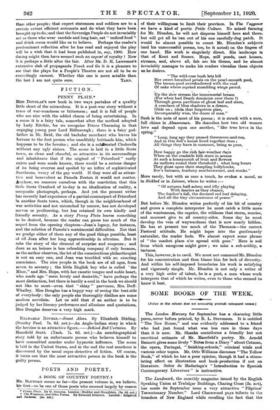FICTION.
PENNY PLAIN.* Miss Dotrous's new book in two ways partakes of a quality little short of the miraculous. It is a post-war story without a trace of war-weariness or bitterness ; and it is full of people who are nice with the added charm of being entertaining. In a sense it is a fairy tale, somewhat after the method adopted by Lady Ritchie, for we recognize Prince Charming in that engaging young peer Lord Bidborough ; there is a fairy god- father in Mr. Reid, the old bachelor merchant who leaves his fortune to the first person who unselfishly befriends him, which happens to be the heroine ; and she is a sublimated Cinderella without any ugly sisters. The scene is laid in a little Scots town, so clean and • cheerful, so attractive in its surroundings and inhabitants that if the original of " Priorsford " really exists and were made known, there would be a serious danger of its being overrun and spoiled by an influx of sophisticated Southrons, weary of the gay world. If they were all as attrac- tive and benevolent as Pamela Reston it would not matter. Anyhow, we reassure ourselves with the conviction that this little Scots Cranford of to-day is an idealization of reality, a composite photograph, perhaps- And yet the present writer has recently had experience of a partial counterpart of Priorsford in another Scots town, which, though in the neighbourhood of war activities and not untouched by sorrow, has not developed nerves or profiteering, but has retained its own kindly and friendly serenity. As a story Penny Plain leaves something to be desired, because the reader can guess too much of the sequel from the opening chapters—Jean's legacy, for instance, and the solution of Pamela's matrimonial difficulties. Not that we grudge either of them any of the good things possible, least of all Jean after her long apprenticeship in altruism. But it robe the story of the element of surprise and suspense ; and Jean as an heiress is less refreshing company if only because, as the author observes, the lot of the conscientious philanthropist is not an easy one, and Jean was troubled with an exacting conscience. The nice people in the book are of all ages, from seven to seventy ; the little English boy who is called ` the Mhor," and Mrs. Hope, with her caustic tongue and noble heart, who made age " seem lovely and desirable," have perhaps the most distinction, but there is hardly a soul in the book we should not like to meet—even that " shiny " parvenue, Mrs. Duff- Whalley. Miss Douglas has a happy way of seeing the best side of everybody: the only people she thoroughly dislikes are some modern novelists. Let us add that if an author is to be judged by her literary preferences and allusions and quotations, Miss Douglas deserves a very high mark.


































 Previous page
Previous page